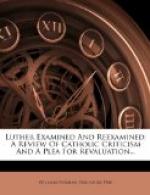What elements of appalling greed and levity had entered the holiest transactions of the Church can be seen from the following summing up of the situation daring Luther’s time: “A large amount of worldly power was at this time conferred in most instances, together with the bishoprics; they were held more or less as sinecures according to the degree of influence or court favor possessed by the recipient or his family. The Roman Curia thought only of how it might best derive advantage from the vacancies and presentations; Alexander extorted double annates or first-fruits, and levied double, nay, triple tithes; there remained few things that had not become matter of purchase. The taxes of the papal chancery rose higher from day to day, and the comptroller, whose duty it was to prevent all abuses in that department, most commonly referred the revision of the imposts to those very men who had fixed their amounts. For every indulgence obtained from the datary’s office, a stipulated sum was paid; nearly all the disputes occurring at this period between the states of Europe and the Roman Court arose out of these exactions, which the Curia sought by every possible means to increase, while the people of all countries as zealously strove to restrain them.
“Principles such as these necessarily acted on all ranks affected by the system based on them, from the highest to the lowest. Many ecclesiastics were found ready to renounce their bishoprics; but they retained the greater part of the revenues, and not unfrequently the presentation of the benefices dependent on them also. Even the laws forbidding the son of a clergyman (!) to procure induction to the living of his father, and enacting that no ecclesiastic should dispose of his office by will (!), were continually evaded; for as all could obtain permission to appoint whomsoever he might choose as his coadjutor, provided he were liberal of his money, so the benefices of the Church became in a manner hereditary.




